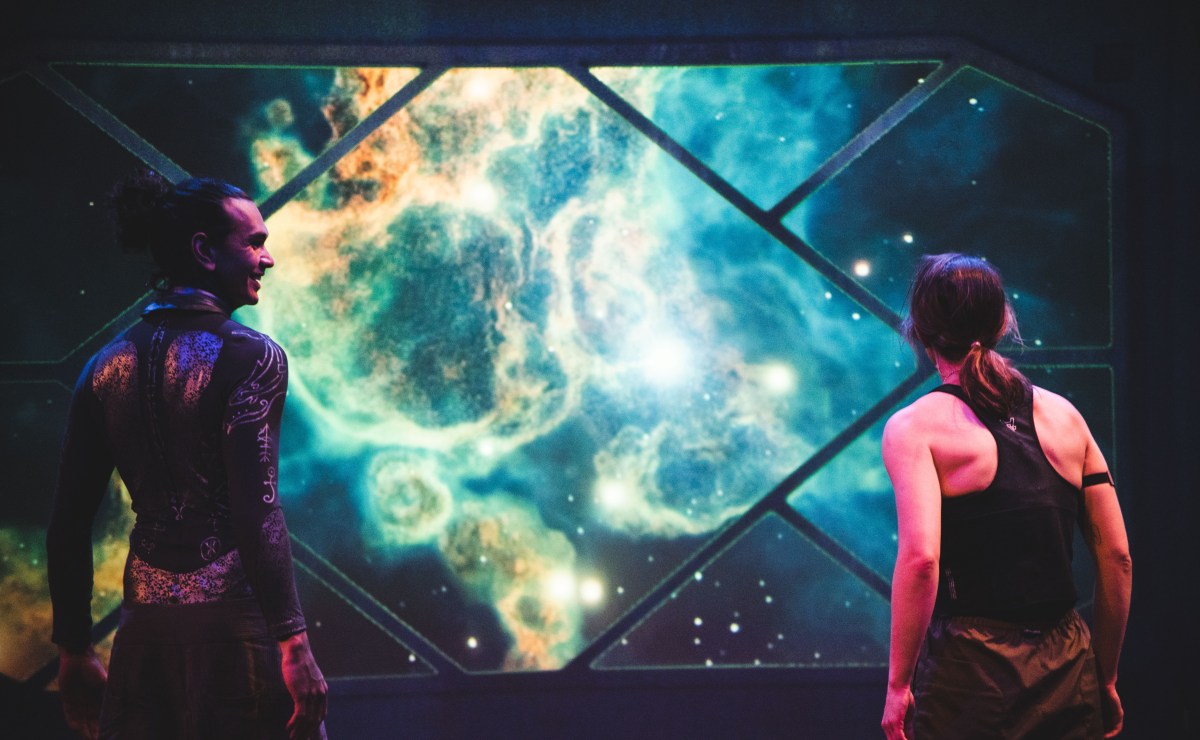The Dead Puppet Society’s contemporary reimagining of Herman Melville’s classic novel Moby Dick takes us on a journey into 3022, where earth has suffered major environmental upheavals and is now dying. The planet is covered by dense cloud, with most people living in a sombre twilight world, apart from a small elite of the rich corporate class at the top of the tallest mountains. To survive, most are forced to look to space and other planets to find the resources to survive. With its core environmental theme, based on the omnipresent issue of the rapid decline of our natural world, Ishmael was already sounding all too familiar and not just as a science-fiction. Marry this concept with a live stage production demonstrating the vastness of space with high tech imaging and video projections, and Ishmael promised a great night, with exciting new ways of staging and delivering theatre.
Writer David Morton, who also directs and is co-designer, has taken the main characters of Melville’s novel, transposing them from a 19-century whaling ship to a 31st-century space ship, MV (Mining Vehicle) Pequod. Here it is captained by a female Ahab (Barbara Lowing) with a reputation for ruthlessness. Our heroine, young Ishmael (Ellen Bailey), is a climate change refugee from ‘under the clouds’ and has been offered a chance to live a new life. This entails taking a dangerous voyage to the outer solar system on MV Pequod. The only other crew member is Queequeg (Patrick Jhanur), an artificially intelligent droid with amazing powers of strength and who, we discover, is also immortal.
While the play began promisingly, with an interesting premise loosely based on Melville’s novel, the narrative had many flaws and inconsistences that failed to provide a cohesive whole. A weak and questionable storyline was matched with cardboard cut-out, almost cartoonish characters, with the three actors struggling with a limp text that was often hard to follow. Ishmael starts as an angry, tough youngster, trusting no-one, determined to save herself no matter what. The writing keeps her on this one note throughout most of the play, and, while Ellen Bailey tries her best, the character is deeply flawed and unlikeable. Barbara Lowing’s Ahab, perhaps because she has been transposed as a woman, shows a much softer side than the Ahab after whom she is named. She is nowhere near as threatening, even when we first meet her, whereas Melville’s Ahab is completely mad and totally fixated on capturing the white whale to the detriment of all else.
As Queequeg, Patrick Jhanur’s character is enigmatic. While it was an interesting device to make him into an android, the differences between droid and human needed much more delineation. As played, he seemed to be a rather nice, ordinary young man with little sense of his specially described powers. Apparently Queequeg has no pulse and presumably no heart, but he demonstrated strong human emotions. No attempt was made to give him a robotic framework so that the character was bland and, consequently, uninteresting. Moreover, despite pre-publicity notes stating the importance of the decline of the natural world as an intrinsic aspect of the play, such doomsday messaging is actually not seen as an issue for the characters, so it fails to have appropriate resonance for an audience.
Read: Exhibition review: Pragma: Perils and Passions, Lost Eden Creative, WA
What did work effectively is what Dead Puppet Society obviously does best – technological wizardry with some interesting and high-quality special effects. The use of projection and video, ably managed by Justin Harrison, was effective in showing lunar and solar system backdrops, the various flying asteroids as well as the bridge of the Pequod. All this was strongly reminiscent of episodes of Star Wars, while Starbuck, the computer operating system, echoes Hal in 2001: A Space Odyssey, with an equally wonderful voice-over by Anthony Standish. The sequences when Ishmael was learning to fly the space craft and manage the hoppers were impressively staged. The use of a special camera to photograph the beautifully constructed model sets, moved manually by the actors, and then projected onto the large back screen was innovative technology.
An animated and atmospheric electronic score by indie pop musician, Bec Sandridge, worked well as background music but as it was impossible to hear the lyrics, it was difficult to determine if the music enhanced the narrative and helped to describe the character development of the actors.
Ishmael is certainly an interesting exercise in demonstrating how we can use technology to great effect in live theatre, which helps to alleviate the need to build large sets and makes touring productions much simpler and efficient. But such technology cannot be utilised at the expense of developing both a strong narrative and script, and fleshing out the all-important characters.
Ishmael, an adaptation of the novel by Herman Melville
Queensland Performing Arts Centre, Dead Puppet Society and Brisbane Festival in association with Screen Queensland
Cremorne Theatre, QPAC, Brisbane
Writer, designer and director: David Morton
Creative Producer: Nicholas Paine
Associate Director: Matt Seery
Composer: Bec Sandridge
Projection Designer: Justin Harrison
Sound Designer and music supervisor: Tony Brumpton
Lighting Designer: Christine Felmingham
Co-Designer (props and locations): Jennifer Livingstone
Costume Designer: Nathalie Ryner
Dramaturg: Louise Gough
Cast: Ellen Bailey, Patrick Jhanur, Barbara Lowing and Anthony Standish (voiceover)
Ishamel will be performed until 18 September 2021
Tickets: $39-49





